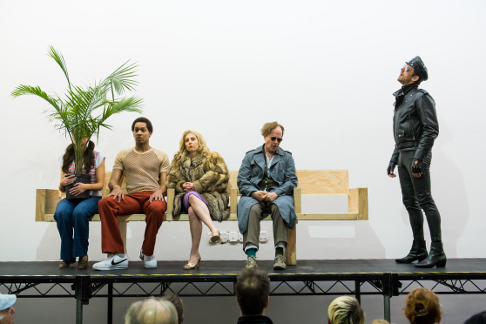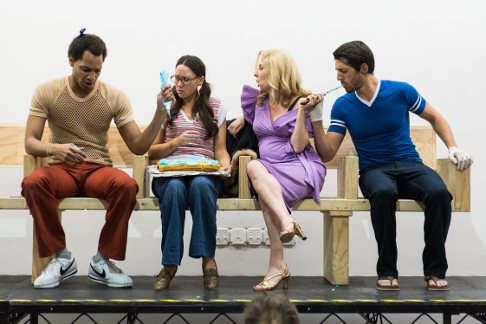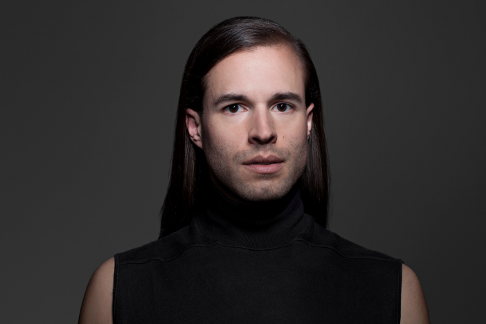![Scene from Orlando [Photo by Ian Douglas]](http://www.operatoday.com/_75X0715.png)
04 May 2015
Orlando Explores Art Without Boundaries
R.B. Schlather’s production of Handel’s Orlando asks the enigmatic question: Where do the boundaries of performance art begin, and where do they end?
English Touring Opera are delighted to announce a season of lyric monodramas to tour nationally from October to December. The season features music for solo singer and piano by Argento, Britten, Tippett and Shostakovich with a bold and inventive approach to making opera during social distancing.
This tenth of ten Live from London concerts was in fact a recorded live performance from California. It was no less enjoyable for that, and it was also uplifting to learn that this wasn’t in fact the ‘last’ LfL event that we will be able to enjoy, courtesy of VOCES8 and their fellow vocal ensembles (more below …).
Ever since Wigmore Hall announced their superb series of autumn concerts, all streamed live and available free of charge, I’d been looking forward to this song recital by Ian Bostridge and Imogen Cooper.
Although Stile Antico’s programme article for their Live from London recital introduced their selection from the many treasures of the English Renaissance in the context of the theological debates and upheavals of the Tudor and Elizabethan years, their performance was more evocative of private chamber music than of public liturgy.
Evidently, face masks don’t stifle appreciative “Bravo!”s. And, reducing audience numbers doesn’t lower the volume of such acclamations. For, the audience at Wigmore Hall gave soprano Elizabeth Llewellyn and pianist Simon Lepper a greatly deserved warm reception and hearty response following this lunchtime recital of late-Romantic song.
For this week’s Live from London vocal recital we moved from the home of VOCES8, St Anne and St Agnes in the City of London, to Kings Place, where The Sixteen - who have been associate artists at the venue for some time - presented a programme of music and words bound together by the theme of ‘reflection’.
'Such is your divine Disposation that both you excellently understand, and royally entertaine the Exercise of Musicke.’
‘And there was war in heaven: Michael and his angels fought against the dragon; and the dragon fought and his angels, And prevailed not; neither was their place found any more in heaven … that old serpent … Satan, which deceiveth the whole world: he was cast out into the earth, and his angels were cast out with him.’
There was never any doubt that the fifth of the twelve Met Stars Live in Concert broadcasts was going to be a palpably intense and vivid event, as well as a musically stunning and theatrically enervating experience.
‘Love’ was the theme for this Live from London performance by Apollo5. Given the complexity and diversity of that human emotion, and Apollo5’s reputation for versatility and diverse repertoire, ranging from Renaissance choral music to jazz, from contemporary classical works to popular song, it was no surprise that their programme spanned 500 years and several musical styles.
The Academy of St Martin in the Fields have titled their autumn series of eight concerts - which are taking place at 5pm and 7.30pm on two Saturdays each month at their home venue in Trafalgar Square, and being filmed for streaming the following Thursday - ‘re:connect’.
The London Symphony Orchestra opened their Autumn 2020 season with a homage to Oliver Knussen, who died at the age of 66 in July 2018. The programme traced a national musical lineage through the twentieth century, from Britten to Knussen, on to Mark-Anthony Turnage, and entwining the LSO and Rattle too.
With the Live from London digital vocal festival entering the second half of the series, the festival’s host, VOCES8, returned to their home at St Annes and St Agnes in the City of London to present a sequence of ‘Choral Dances’ - vocal music inspired by dance, embracing diverse genres from the Renaissance madrigal to swing jazz.
Just a few unison string wriggles from the opening of Mozart’s overture to Le nozze di Figaro are enough to make any opera-lover perch on the edge of their seat, in excited anticipation of the drama in music to come, so there could be no other curtain-raiser for this Gala Concert at the Royal Opera House, the latest instalment from ‘their House’ to ‘our houses’.
"Before the ending of the day, creator of all things, we pray that, with your accustomed mercy, you may watch over us."
The doors at The Metropolitan Opera will not open to live audiences until 2021 at the earliest, and the likelihood of normal operatic life resuming in cities around the world looks but a distant dream at present. But, while we may not be invited from our homes into the opera house for some time yet, with its free daily screenings of past productions and its pay-per-view Met Stars Live in Concert series, the Met continues to bring opera into our homes.
Music-making at this year’s Grange Festival Opera may have fallen silent in June and July, but the country house and extensive grounds of The Grange provided an ideal setting for a weekend of twelve specially conceived ‘promenade’ performances encompassing music and dance.
There’s a “slide of harmony” and “all the bones leave your body at that moment and you collapse to the floor, it’s so extraordinary.”
“Music for a while, shall all your cares beguile.”
The hum of bees rising from myriad scented blooms; gentle strains of birdsong; the cheerful chatter of picnickers beside a still lake; decorous thwacks of leather on willow; song and music floating through the warm evening air.
![Scene from Orlando [Photo by Ian Douglas]](http://www.operatoday.com/_75X0715.png)
R.B. Schlather’s production of Handel’s Orlando asks the enigmatic question: Where do the boundaries of performance art begin, and where do they end?
This barebones, stripped-down production had less to do with the performances and more with the process of mounting an opera as an art form in itself. For the weeks leading up to the performances, the rehearsal room was an art exhibition in which curious art-seekers were encouraged to wander in and out of rehearsals, observing the exciting and at times arduous process of preparing an operatic production for an audience.
Upon first glance, the Whitebox Art Center does seem to lend itself as more an exhibition space than a performance venue. With blank white walls and gallery lighting, the only suggestion of a stage was a runway-like platform above the folding chairs that made up the audience seating area. However, the excitement in the room was tangible as R.B. Schlather made a pre-performance announcement welcoming the audience to take photos during the performance, especially if they posted the photos with hashtag “Orlando” on their respective Instagram or Twitter accounts.

Schlather’s production proves how unnecessary a multimillion dollar set budget can be when committed performers take the stage. Geoffrey McDonald conducts with energy and precision, eliciting an authentically Baroque and highly musical performance from an excellent orchestra, with Elliot Figg playing elegantly on the harpsichord. Drew Minter, playing the title role, sings with extraordinary musicality and fine coloratura, while managing to express Orlando’s madness without ever bordering on the cartoonish. Kiera Duffy (Angelica) shines in her second act arias, particularly while expressing her loss of control as her situation grows increasingly dire. Brennan Hall (Medoro) has a full voice with a strong upper register, and sings with heartbreaking sincerity.
The show-stoppers are baritone Hadleigh Adams (Zoroastro) and soprano Anya Matanovic (Dorinda). The audience tingled with excitement every time Hadleigh Adams stepped onstage, whether he was donning a Leather Daddy suit, a Santa costume, or a too-small pair of underwear and nothing else. Adams manages to use his gorgeous instrument with ease and beauty even as he is put under the strains of outlandish costumes or unusual staging. His movement is deft and cat-like, and his sound production never suffers even as he maneuvers the stage with the agility of a seasoned dancer.

Anya Matanovic has an enormously resonant voice that moves with lightness and agility while preserving its fullness. Her sound filled the entire room at all points in her register and during all her movements, even when facing the wall or with her face obscured by a prop. Her aria, “Amore è qual vento” was brilliantly and deftly performed, even as Matanovic pulled off a Sandra Dee-style transformation from innocent shepherdess to a woman empowered by her own sexiness.
This excellent cast offers Schlather the opportunity to employ outlandish, even ridiculous staging and production ideas. This ridiculousness does not detract from the performance; in fact, Schlather manages to play on the conventions of opera very well in a way innovates even while tipping a hat to the traditions of opera seria. He recognizes the inherent sexuality in much of the libretto and music, and works this insight to his advantage. His singers offer unafraid, impassioned performances that speak to Schlather’s ability to demolish the barriers of propriety and politeness that seem to plague much of traditional operatic performance.
 R. B. Schlather [Photo by Matthu Placek]
R. B. Schlather [Photo by Matthu Placek]
At times, this desire to entertain caused certain production choices to distract from crucial musical moments; in particular, the appearance of Zoroastro onstage clad only in a small pair of underwear seemed ill-timed with one of Orlando’s grandest and most complex arias. However, other moments worked very well, such as a poignant moment during Angelica’s second act aria in which Medoro spray paints his lover’s name on the back wall in bright orange spray paint. The name of the game for Schlather is experimentation, and for the most part, his boundary-pushing is inventive and intelligent.
Perhaps the most appealing aspect of Schlather’s Orlando is the opportunity to sit back and enjoy excellent classical music without the fear of boredom or discomfort. The stage manager rollerblades onstage in plain view of the audience to carry out some lighting cues. There’s free wine at the door. During the intermission, audience members can peek into the backstage area as they make their way to the restrooms. Gone is the idea that opera is stuffy or is an art form only enjoyed by a strict code of rules. Instead, Schlather offers an artistic performance that innovates while preserving the highest of musical excellence.
Alexis Rodda